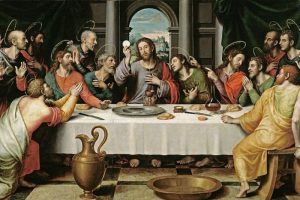A friend and fellow pilgrim got in a row with a friend on Facebook and asked for my help. You might enjoy the question and the answer.

-
Save
My friend wrote: “I have a quick apologetic question. A Protestant Facebook page was denying the Eucharist and I pasted St Ignatius’ quote about the Eucharist, “Let us stand aloof from such heretics. They abstain from the Eucharist and from prayer, because they confess not the Eucharist to be the flesh of our Savior Jesus Christ, which suffered for our sins, and which the Father, of His goodness, raised up again.” (Ignatius of Antioch, “The Epistle of Ignatius to the Smyrnæans). (Picture to right: Ignatius of Antioch eaten my lions in 106 AD).
The antagonist guy responded with this:
“Mike, I have a homework assignment for you. I want you to find out who “those who hold heterodox opinions” are. I want you to find out what they believe. I want you to read this letter from beginning to end and look for the context of what you posted. Can you confirm in the affirmative that Ignatius had Aristotelian concepts in mind when writing his letter?”
“Any idea what he is referring to and how to respond? If you don’t have time to respond, I understand.”
Mike is a friend so of course I had time to respond:

The truth is — doctrine develops over time. For example Ignatius would not have described the two natures of Christ in terms of the hypostatic union nor the Trinity in the sophisticated words of “generation,” “proceeds” and “spiration” that were later used to more carefully and philosophically define what orthodox Christians had always believed but were later developed further to combat the heretics.

Ignatius believed in the real presence of Christ in the Eucharist, the two natures of Christ, the Trinity, etc. though he would not have used the sophisticated words later developed to define these things more precisely and deeply.
The little sapling doesn’t look like the big oak tree but they are organically the same thing. The baby pictures of your challenger may not look like him as a full-grown man but he’s developed over time and is still the same organic person. Theology also develops and takes on new words and explanations but is only a further development of what was already believed by the early Christians.
Hope that helps. I feel sorry for the deluded Protestants who are so “wise” in their disputations. I used to be one of them and thank God those days are in the past.”



This Post Has 3 Comments
A lot of the writings from the the Ante Nicene Fathers includes questions about whether or not the body of Christ is the earthly body or the spiritual body or the physical body after resurrection. My reading of the lot tells me that there have been more than enough of us looking at the questions and that the idea of what was named Transubstantiation prevails.
This is exactly right. The question is not whether St. Ignatius believed in the St. Thomas' formulation of the Real Presence. That makes no sense historically. Another, better way of asking the question is this: If St. Ignatius of Antioch were introduced to St. Thomas's way of articulating the doctrine, would he have recognized it as capturing what he affirmed, or would he have sided with those who denied transubstantiation? The answer to that question should be obvious.
Steve Ray here: Well said!
My question to the challenger would be this: Did the Apostles take Jesus at His Word when He said, "This is my Body…, This is my Blood of the New Covenant?" It was the pronouncing of His Last Will and Testament.
Did they believe Him when He said something more than manna is here?
Did they believe Him enough to continue the Sacrifice of the Mass even though many were being martyred for those beliefs?
You want to believe only what you can see for yourself, but you believe many things you cannot see. You believe in air. You cannot see it, only its effects. You cannot see oxygen, only its effects. You cannot see a person's thoughts, only their effects. Why can you not believe that God could do something so tremendously stupendous as to give us Himself — His full, glorified self — in the form of
STEVE RAY HERE: Cheryl, I agree with you completely. These are excellent questions and the answers are obvious. God bless you!
Comments are closed.